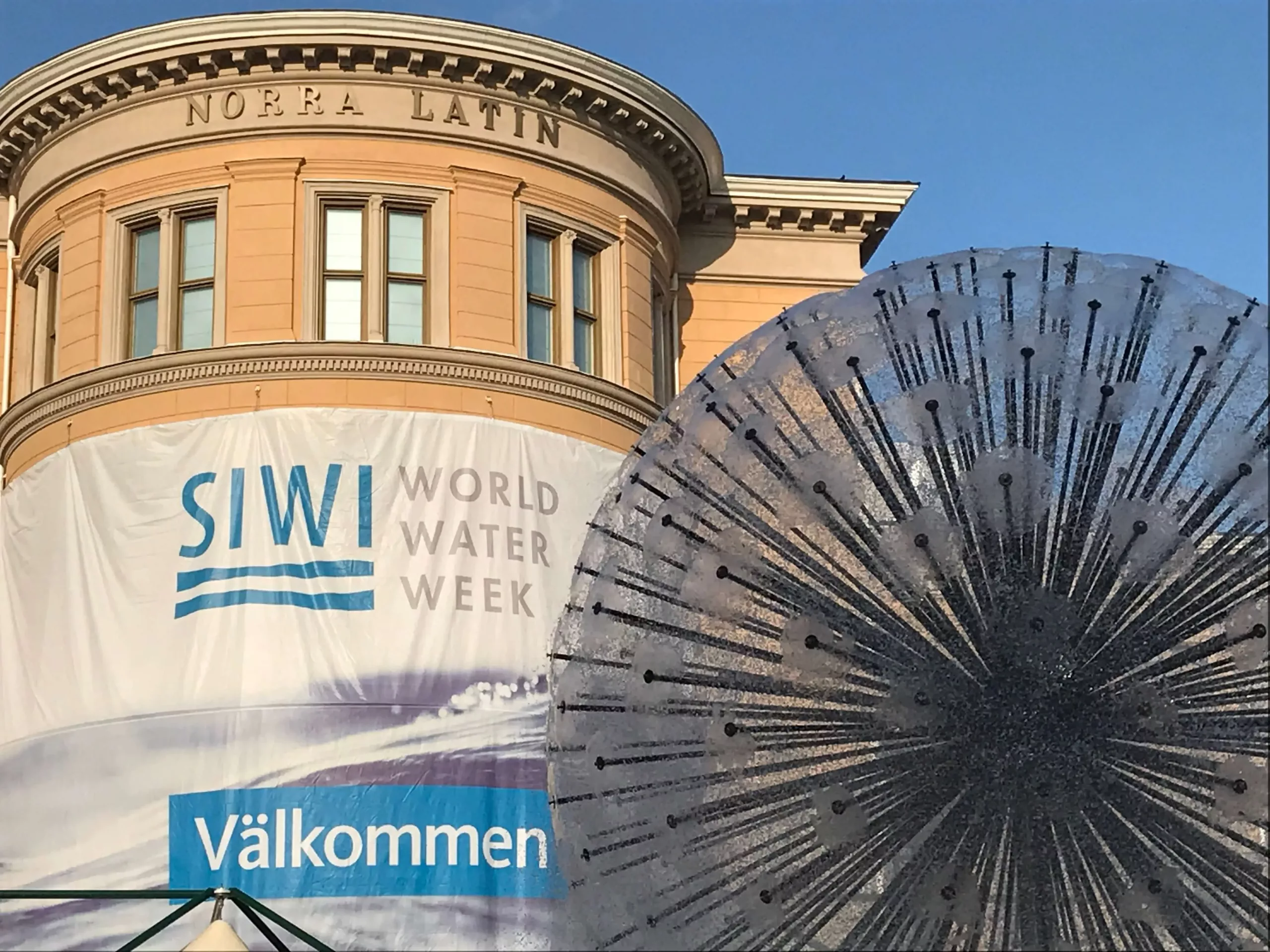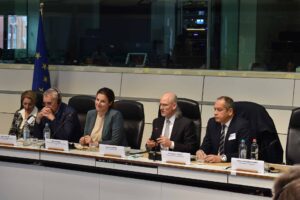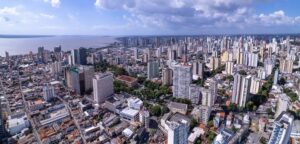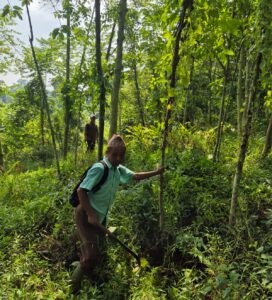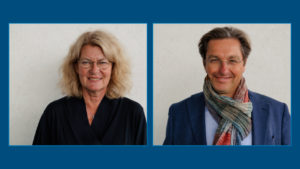Highlights from World Water Week 2017
World Water Week is an annual focal point for the globe’s water issues. This year, the Week brought together over 3 200 participants from all over the world, focusing on the world’s most pressing water related challenges. Under this year’s theme Water and waste: Reduce and reuse the WGF team took the opportunity to highlight the important link between water governance and sustainability through seminars, events, SIWI Sofas, showcases and mingles. Connecting novel ideas and tested policy with international experts and practitioners.
World Water Week (WWW) is an annual focal point for the globe’s water issues. This year, the Week brought together over 3 200 participants from all over the world, focusing on the world’s most pressing water related challenges. Under this year’s theme Water and waste: Reduce and reuse the WGF team took the opportunity to highlight the important link between water governance and sustainability through seminars, events, SIWI Sofas, showcases and mingles. Connecting novel ideas and tested policy with international experts and practitioners.
For more detail about each of the sessions highlight below, please click their respective titles.
Balancing competing interests and opportunities for better wastewater governance
How do we navigate conflicting interests in managing and using wastewater from a policy and practical perspective? This session brought together wastewater stakeholders to discuss different perspectives and used a marketplace format to showcase recent experiences, tools and policies that are used in South Africa, India, Sweden, Bolivia and Jordan.
The presentations showed that all cases had to balance different interests. It takes time and you have to be patient. Best results often came from decentralization. And win-win stakeholder driven solutions can result in efficient outcomes.
Co-convenors: Stockholm Environment Institute, GIZ, UNDP-SIWI Water Governance Facility, CEPT University, the Water Resource Commission, Sustainable Sanitation Alliance, and Swedish International Agricultural Network Initiative
Global Water Solidarity- Promoting decentralized solidarity in WASH sector
The Global Water Solidarity convened a showcase gathered over 30 local level representatives including the civil society and citizens groups to promote decentralized water solidarity, as exercised by many EU countries. An interactive discussion and debate touched upon programme, institutional and financial needs currently required for this innovative financing mechanism to expand. It was concluded that support coming local authorities should collaborate with support provided by operators. The importance of the Global Water Solidarity in further actions along this way forward was highly acknowledged and appreciated.
Co-convenors: Stockholm International Water Institute, and UNDP-SIWI Water Governance Facility
Plastic Soup and Dead Zones – Source Prevention for Cleaner Seas
Sweden’s Minister of Environment, Karolina Skog participated in this interactive panel discussion together with Jakob Granit, Director General of the Swedish Agency for Marine and Water Management; Andrew Hudson, Head of WOGP; Cees van de Guchte, Deltares; and Tove Ahlström, Head of Sustainability at Apotea.
“Making the link between SDG 6 on water and SDG 14 on oceans was one of the priorities raised by Sweden at the Ocean Conference”, said Karolina Skog. Tove Ahlström described how Apotea recently decided to phase out some 200 products that contained micro-plastics. Andrew Hudson emphasized that the vast majority of marine pollution and plastics come from land – a lot more than the 80 percent figure that is often cited.
Co-conveners: Action Platform for Source-to-Sea Management, Deltares, FAO, Swedish Agency for Marine and Water Management and UNDP-SIWI Water Governance Facility
Protection of the Sacred: Wastewater management and Indigenous Realities
Protection of the Sacred was an interactive session about indigenous views on water and wastewater management. The session began with a brief introduction of the cultural and spiritual significance of water and its protection to Indigenous people, with first hand experience from First Nations representatives from Canada. Recent research related to indigenous peoples and water and wastewater systems or projects—with a focus on how organizations have successfully worked with Indigenous peoples – were presented, which triggered an honest conversation with the speakers and indigenous representatives on how to break down barriers.
Co-conveners: International Labour Organization, Bremen Overseas Research and Development Association, Human Rights Watch, Te Kopu – Pacific Indigenous & Local Knowledge Centre of Distinction, UNDP-SIWI Water Governance Facility
Accountability in WASH from emergency to development
Case studies from Ethiopia, Jordan/Syria and Somalia to highlighted experiences from different emergency contexts. In Ethiopia and Somalia, WASH Clusters are present to coordinate all actors involved in responding to the humanitarian situations. A key difference is that more than 100% of the funding target has been reached in Ethiopia, compared to only 28% in Somalia. For Somalia, this has limited both the quality of services delivered and the accountability mechanisms. In refugee camps in Jordan, participatory needs assessments and complaints mechanisms have been established to involve affected people in service delivery. A key challenge is working with government actors in Jordan and Syria, to ensure accountable service delivery once refugees leave the camp.
Co-conveners: Global WASH Cluster, UNDP-SIWI Water Governance Facility, United Nations Children’s Fund
MENA Focus: Water Security and Water Integrity challenges in the MENA region
The Middle East and North Africa (MENA) is the world’s most water stressed region. Over 60% of MENA’s population lives under high or very high water stress, compared to some 35% for the rest of the world. Recent work shows that GDPs of MENA countries could face the greatest global decreases from climate-induced water scarcity ranging from 6-14%.
Public institutions face a range of challenges in modernizing. Governance bottlenecks and integrity disparities jeopardize and hamper the sustainability of the water sector. Effective water governance that is integrity-bound can assist with overcoming the challenges, deliver concrete benefits for the people and the environment of the MENA region, and contribute to regional peace and stability.
The session provided an overview of the status of water security in the MENA region, described existing water-related integrity challenges and outlined emerging opportunities to achieve water security.
Co-convened: The World Bank Group, and UNDP-SIWI Water Governance Facility
Scaling-Up Pollution Control and Wastewater Management from Source to Sea
In this session Birgitta Liss Lymer, Programme Manager for WGF and the Source to Sea Platform (S2S), discussed why we see limited policy discourse between water and coastal management communities.
“The tragedy with source-to-sea linkages are that negative impacts are often experienced far downstream from the activities that contribute to them. Upstream stakeholders may not be aware of the extent of impacts they are contributing to, they may not have the capacity to implement the necessary measures or they may lack incentives to invest in pollution reduction measures that will primarily benefit the downstream.”
Co-conveners: Global Environment Facility, Global Environment Facility – International Waters: Learning Exchange and Resource Network, Inter-American Development Bank, The World Bank Group, United Nations Development Programme, UN Environment, United Nations Industrial Development Organization
The open government paradigm (OGP) sets the principles of transparency, citizen participation and accountability at the heart of policy making and promotes the collaboration of civil society and government to improve public and citizen services. In this sense, addressing water issues with an open government approach represents an opportunity for influence on public sector policies to ensure access to water rights.
Experts presented different examples of water commitments that have been already included in national action plans and explained how the OGP has been leveraged to develop an open web application which allows for the reporting of water use rights and complaints. Participants had the opportunity to discuss and learn more about how to get involved on the OGP and how to incorporate Sector-related Commitments.
Co-conveners: Fundación Avina, Open Government Partnership, UNDP-SIWI Water Governance Facility
SEMINAR: Governance of water and waste: A key to sustainable development
This three-part seminar covered aspects of wastewater management and reuse through different perspectives. The panel, which included Marianne Kjellén from UNDP and Birgitta Liss Lymer, WGF, recognized the value of IWRM as an umbrella under which a range of water governance approaches, such as water-energy-food nexus, corporate water stewardship, integrated flood management and source-to-sea, can be implemented depending on the local context. The importance of investing in the creation of a shared vision to unite local governments, communities, private sector and other stakeholders in the basin around a common path towards sustainable water management was emphasized. Håkan Tropp, WGF Director, facilitated a roundtable discussion that concluded that technical options are available to enable governance to be a building block for urban water reuse, but that political leadership is necessary to guide and provide incentives for engagement of other actors, including private sector. The seminar closed with discussing the link between integrity and water pollution, including good and bad practices when it comes to addressing integrity risks in wastewater management.
Co-conveners: Stockholm International Water Institute, International Water Association, UNDP-SIWI Water Governance Facility, Water Integrity Network, World Water Council
